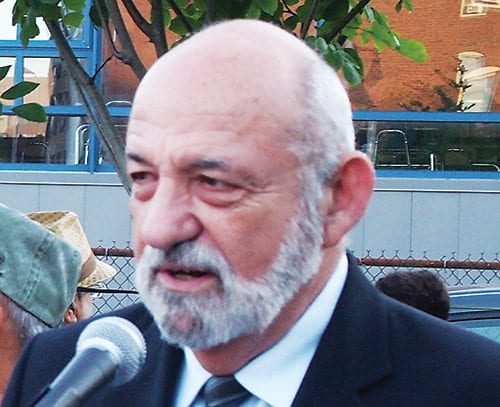Puerto Ricans seek debt relief
Local activists concerned about worsening situation on island

Puerto Rico’s long-struggling economy went from bad to worse this year, with Governor Alejandro Garcia Padilla asserting that the island’s $72 billion debt burden may never be repaid. Creditors are calling on Puerto Rico’s government to close schools and cut services while Garcia Padilla and others on the island are appealing to the Obama administration to allow Puerto Rico to declare bankruptcy.
Puerto Rico’s debt crisis comes after a decade of economic woes that forced the island’s government to borrow heavily in order to maintain basic services. Puerto Rico was hit hard by the 2006 recession and never has recovered. Over the last nine years, its economy has shrunk by more than 10 percent, losing 250,000 jobs. Stagnant economic conditions have prompted 300,000 people to leave the island in the last 10 years, with 84,000 in the last year alone. Forty-five percent of the islands residents live below the poverty line.
Amidst these circumstances, government services have nearly ground to a halt.
“You go to a municipal office and they have no staff,” said Gladys Vega, executive director of the Chelsea Collaborative, whose family owns a farm in Guayama, Puerto Rico. “It’s a bit of a nightmare. Clothing and food are costly. Municipal services are pretty much non-existent. If the U.S. government doesn’t do anything, it will only get worse.”
Garcia Padilla has warned that the government will run out of money next month.
At a Senate hearing last week, Sen. Elizabeth Warren called on the Obama administration to take decisive leadership and help Puerto Rico restructure its debt.
By the Numbers: Puerto Rico
$72 billion Puerto Rico’s debt
250,000 The number of jobs Puerto Rico has lost in the last 10 years
300,000 The number of Puerto Ricans who have left the island in the last 10 years
84,000 The number of Puerto Ricans who left in the last year
“I think Treasury needs to step up and show more leadership here,” she said. “During the financial crisis, when the banks were in trouble, Treasury did a lot more than just bail them out. Treasury stretched the limits of its authority to make sure that the banks stay afloat. It helped broker deals between banks, it applied pressure to get parties to accept deals they may not have liked very much. It has done that in multiple other crises as well, and now the people of Puerto Rico are calling.”
The Obama administration last week outlined a plan that would allow Puerto Rico to restructure its debt, place the island under independent financial oversight, reform Medicaid and give residents access to the Earned Income Tax Credit.
But some are arguing for more radical measures. In last week’s hearing, Senator Bernie Sanders questioned whether Puerto Rico should be required to repay debts that were incurred in violation of its own constitution, which limits external debt to 15 percent of total revenues. The island’s debt payments for 2016 are estimated to be 42 percent of its projected revenues.
“There is a human tragedy unfolding, and in my view, Wall Street should not be believing that they can draw blood from a stone,” Sanders said.
Historical roots
The United States invaded Puerto Rico in 1898 and has retained the island as an unincorporated U.S. territory since. Puerto Ricans serve in the U.S. military and are U.S. citizens. But those living on the island cannot vote in U.S. presidential elections and their representative in Congress is a non-voting member.
Some blame the island’s economic woes on its colonial relationship with the United States, which has played a major role in shaping the island’s economy. In the early years of U.S. rule, the island was dominated by large U.S. sugar companies. In more recent years, the island’s economy has relied heavily on manufacturing, with U.S. pharmaceutical, petrochemical and textile firms operating plants there.
“The problem with Puerto Rico is Washington,” said Jaime Rodriguez, who was born there and moved to Boston after serving in Vietnam. “The people who run the colony keep using Puerto Rico to make money. The people who live in Puerto Rico suffer.”
Rodriguez and others point to the Jones Act, which requires ships carrying goods from one U.S. port to another to be built in the United States, with U.S. owners and mostly U.S. crews. The 95-year-old law makes it unprofitable for Puerto Rico to trade with the Dominican Republic, Venezuela or other Caribbean nations, forcing retailers there to import more costly goods from the U.S.
“The island’s economy is centered around U.S. businesses,” says Felix D. Arroyo, the Suffolk County Register of Probate. “It has been designed that way.”
Arroyo joined other Puerto Rican activists and elected officials October 14 in Orlando for a meeting on the nation’s debt crisis and is helping organize a similar meeting in Boston, scheduled for December 5. The location has not yet been finalized.
“This conference is nonpartisan,” he said. “We invite anyone who wants to work with us on these issues.”


![Banner [Virtual] Art Gallery](https://baystatebanner.com/wp-content/uploads/2024/04/Cagen-Luse_Men-at-store-e1713991226112-150x150.jpg)



